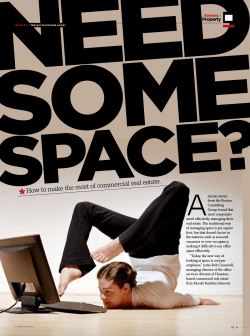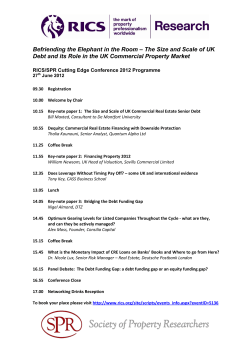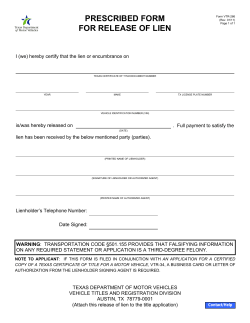
I AM NO LONGER ON ASSISTANCE. HOW CAN I GET
WHAT IS A LIEN? A lien is a document filed with the county registry of deeds which alerts anyone who wants to buy your house or land that you have a debt against the property which must be paid when the home is sold or refinanced. WILL THE STATE FILE A LIEN ON MY HOUSE? If you receive OAA, ANB, or APTD cash assistance, the State will file a lien on your home or land to get paid back for this assistance. If you live in a nursing home and your house or land is not being lived in by your spouse, minor or disabled child(ren), or sibling with an equity interest, the State will file a lien to get paid back for the OAA, ANB, MEAD, or APTD medical assistance (Medicaid) you received after age 55. IF THE STATE FILES A LIEN ON MY HOUSE, WHAT WILL HAPPEN? When the State files a lien on your house, it does not mean: • • that you must move or sell your house; or that the State owns your house or wants to own your house. What it does mean is that when you sell or refinance the property, the State will collect on the lien that was placed on your house or land. This means that money from the sale goes to the State to pay off the OAA, ANB, MEAD, or APTD assistance you received. WHAT IF I OWN MY PROPERTY WITH OTHER PEOPLE? If you receive OAA, ANB, or APTD cash assistance and the property is jointly owned with your spouse, when the property is sold or refinanced the State will collect on the full amount of the lien, if the money from the sale is enough to pay off the lien. If the property is jointly owned with someone other than your spouse, the State will collect on the lien for cash assistance only up to the amount that equals your share of the ownership of the property. If you receive OAA, ANB, MEAD, or APTD medical assistance and the property is jointly owned, the State will collect on the lien only up to the amount that equals your share of the ownership of the property. I AM NO LONGER ON ASSISTANCE. HOW CAN I GET RID OF THE LIEN ON MY PROPERTY? You can make a voluntary payment to the State in an amount equal to the assistance provided. Upon receipt of the payment, the State will remove the lien. Even if you no longer receive assistance, the State will only act upon the lien if you sell or refinance your property, or die. WHAT IS AN ESTATE CLAIM? An estate is all of the property (such as cash, savings, stocks, land, etc.) owned by a person at the time of death. For the purpose of recovery of medical assistance, your estate includes both assets that pass through probate and assets that pass outside the probate process. Your estate includes property held solely or jointly with others on the date of death. This includes assets held in joint tenancy, tenancy in common, life estates and living trusts regardless of when the asset was obtained or divided. If you owe money to creditors (like the State) when you die, the creditors can file a claim against your estate to get paid back the money owed to them. Through the probate process, the court makes sure that: • all debts or claims filed against the estate are paid; and • after debts are paid, any remaining assets go to the proper people. For assets passing outside the probate process, the surviving owners or beneficiaries will be sent a notice of the Department’s claim. WILL THE STATE FILE A CLAIM AGAINST MY ESTATE? When probate is started for someone who received OAA, ANB, MEAD, or APTD cash or medical assistance, the State may file a claim against the estate for repayment of the assistance received. The State will file a claim against your estate for the: • • • OAA, ANB, or APTD cash assistance you received, if the total assistance is more than $100; and/or OAA, ANB, MEAD, or APTD medical assistance you received after age 55, if you are unmarried or widowed at the time of your death and do not have any minor or disabled children. There is no recovery for Medical Assistance received prior to age 55. WHAT IF I HAVE A WILL THAT SAYS MY PROPERTY GOES TO SOMEONE OTHER THAN THE STATE? Probate law provides that creditors, such as the State, must be paid before any directions in a will are followed. If any assets remain after paying all debts against the estate, the court will follow the directions of the will and allow assets to be given to the heirs in the will. You should contact an attorney for more information on how liens and estate claims might apply to your situation. WHAT IF MY ESTATE DOES NOT HAVE ENOUGH FUNDS TO REPAY THE STATE? ARE THERE ANY TIMES WHEN MY ESTATE WON’T HAVE TO REPAY THE STATE? All cash assistance received must be repaid to the State. The State will only file a claim if you are over the age of 55 and you do not have a surviving spouse, minor or disabled child. If repayment of medical assistance received would cause the family to experience a hardship, repayments are sometimes waived. Your family and/or the administrator of your estate can apply for hardship waiver and have the debt forgiven, if the hardship criteria are met. THE STATE DIDN’T FILE A LIEN, CAN THEY STILL FILE AN ESTATE CLAIM? Yes. There are times when the Department does not have the authority to place a lien but may file a claim. Additionally, because a lot can happen between application for assistance and death, there will be situations where a lien is not filed, but an estate claim is appropriate, and vice-versa. Filing an estate claim is based on circumstances existing at the time of the recipient’s death. The State will collect on the funds that are available in your estate even if there is not enough to pay the claim in full. Once your estate is properly probated and closed: • • any remaining debt for OAA, ANB, or APTD cash assistance can be collected from your spouse’s estate when (s)he dies. If you do not have a spouse when you die, any remaining debt is forgiven; and/or any remaining debt for OAA, ANB, MEAD, or APTD medical assistance is forgiven. The State will only take the available funds in your estate to pay for a medical assistance debt. The state will not collect from your spouse’s estate when (s)he dies. Department of Health & Human Services District Offices BERLIN LITTLETON 650 Main St., Ste. 200 Berlin, NH 03570-2496 752-7800 or 800-972-6111 80 North Littleton Road Littleton, NH 03561-3841 444-6786 or 800-552-8959 CLAREMONT MANCHESTER 17 Water Street, Suite 301 Claremont, NH 03743-2280 542-9544 or 800-982-1001 195 McGregor Street, Suite 110 Manchester, NH 03102-3762 668-2330 or 800-852-7493 CONCORD SOUTHERN 40 Terrill Park Drive Concord, NH 03301-9955 271-6201 800-322-9191 3 Pine St. Ext., Ste. Q Nashua, NH 03060-3213 883-7726 or 800-852-0632 CONWAY SEACOAST 73 Hobbs Street Conway, NH 03818-6188 447-3841 or 800-552-4628 50 International Dr. Portsmouth, NH 03801-2862 433-8300 800-821-0326 KEENE ROCHESTER 809 Court Street Keene, NH 03431-1712 357-3510 or 800-624-9700 150 Wakefield Street, Suite 22 Rochester, NH 03867-1309 332-9120 or 800-862-5300 LACONIA 65 Beacon Street West Laconia, NH 03246-9988 524-4485 or 800-322-2121 TTY/TDD Access: Relay NH 1-800-735-2964 or 7-1-1 Form 77s 04/06 Rev. 07/11 SR 06-06 WHAT ARE LIENS AND ESTATE CLAIMS? The law requires all recipients of Old Age Assistance (OAA), Aid to the Needy Blind (ANB), and Aid to the Permanently and Totally Disabled (APTD) cash assistance as well as many recipients of OAA, ANB, APTD, and Medicaid for Employed, Adults with Disabilities (MEAD) medical assistance to repay the State for the benefits they receive. The State collects payment for past assistance in two ways: • • liens against real property; and/or estate claims after a recipient dies. NH Department of Health and Human Services 129 Pleasant Street Concord, NH 03301-3857 www.dhhs.nh.gov/DFA
© Copyright 2025











